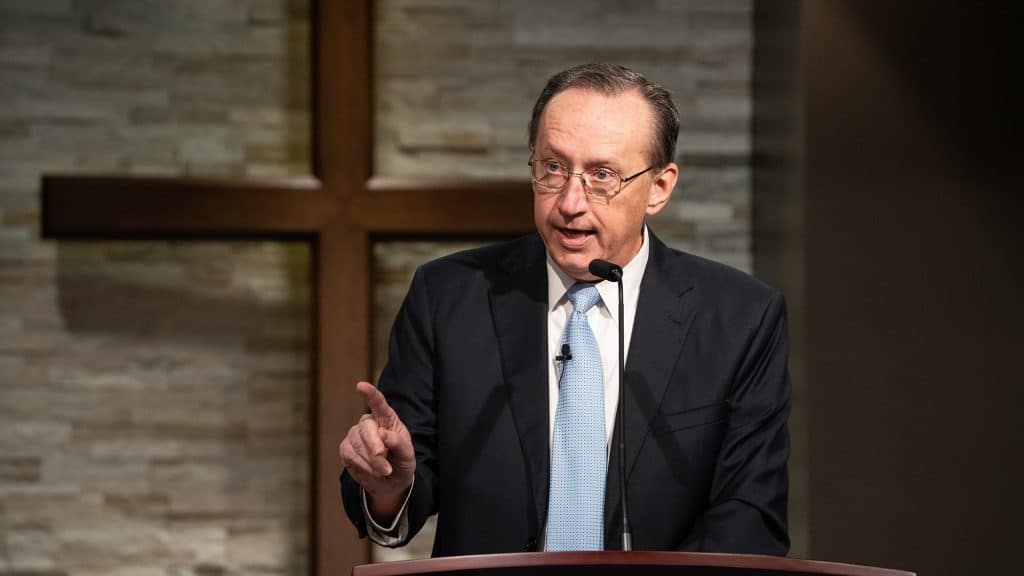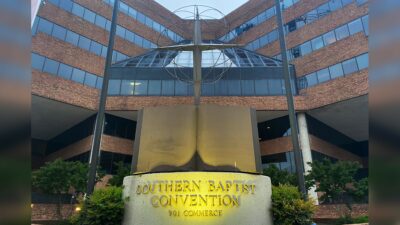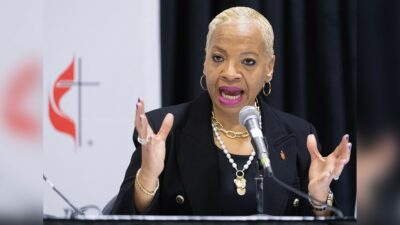In the first chapel service of the spring semester, Gateway Seminary president Jeff Iorg spoke on the tension of maintaining pastoral integrity, while practicing forgiveness and restoration for leaders who engage in egregious behavior
“When a pastor behaves in an unethical or immoral way, our response must be biblical, practical, balanced, and measured,” said Iorg, who heads up the prominent Southern Baptist Convention-affiliated seminary in Ontario, California.
“Today’s message is more than an academic treatise or a theoretical exercise,” he said.
“It’s an acknowledgement of the painful, destructive, divisive results of leadership mistakes and how failing to respond to them appropriately compounds the problem.”
Iorg shared three biblical mandates and four warnings churches must consider when dealing with the moral or ethical failures of pastors.
Your tax-deductible gift helps our journalists report the truth and hold Christian leaders and organizations accountable. Give a gift of $30 or more to The Roys Report this month, and you will receive a copy of “Hurt and Healed by the Church” by Ryan George. To donate, haga clic aquí.
The first mandate Iorg described was biblical forgiveness.
“The Christian doctrine of forgiveness is rich in content, radical in application, and comprehensive in reach,” he said.
Iorg referenced Ephesians 1:7, Colossians 1:14 and 1 Corinthians 6:9b-11a as examples of forgiveness of past sins at conversion. Following conversion, Christians are to confess their sins and depend on his promise to forgive sins as described in 1 John 1:9. Iorg said God expects his followers to also forgive fellow believers and referred to Colossians 3:13b and Matthew 18:21-22.
“All sin is forgivable by God and fellow believers, including any sins of any pastor,” he said.
The second mandate Iorg shared is to attempt restoration.
“When sin shatters Christian fellowship, we must make every effort to restore healthy relationships and preserve our connection with each other,” Iorg said.
Churches must be willing to both confront inappropriate behavior from pastors and support repentance. However, a key question Iorg asked was “restored to what?”
“The passage [Galatians 6:1-2] calls for restoring fallen brothers and sisters to Christian fellowship, not pastoral leadership. This is an important distinction,” Iorg said.
“While repentant pastors should be welcomed into fellowship and supported as they establish new life patterns, there is no obligation to return them to any leadership role.”
The third mandate Iorg called for was upholding biblical standards and the sanctity of the pastoral office.
“Pastors are held to higher standards than political, athletic, entertainment, and corporate leaders,” he said.
“While a womanizer can be an American president, an abuser can be a professional athlete, adulterers can be entertainment icons, and drunkards serve as corporate executives, these behaviors are unacceptable for pastors.”
Iorg said, unlike secular leaders, pastors are measured first by their character and then by their competencies. He said this distinction is often unrecognized, citing the inappropriate use of David as a biblical model of a flawed person restored to pastoral leadership.
“David was a political and military leader – not a pastor,” Iorg said. “The standards for a pastor of a local church are higher than anything we expect of political/military office holders – even those in the Bible.”
One important distinction to help avoid compromising the high standards of pastoral leadership is to separate the office from the person.
“The pastorate is different from and larger than any particular pastor,” he said.
“When a pastor sins, those actions diminish other people who serve in that role because it damages the status of the office – not just the personal reputation of the individual leader.”
Iorg then addressed the direct question: “Is restoration possible for pastors who commit ethical or moral sins?”
“My answer is a qualified yes, but with four cautions which are often not adequately considered today,” he said.
First, the totality of sin must be addressed, including the abuse of relational power and the impact of the sin on the church, the broader Christian community and the secular community.
“When a pastor behaves unethically or immorally, they also abuse the inherent power in their leadership relationships,” Iorg said.
“If a leader is unwilling to admit the totality of their sin and acknowledge its broad impact, confession and forgiveness are incomplete… they are not ready for restoration to church fellowship nor a candidate for restoration to any leadership role.”
The second caution for churches is to respond proportionally to the offense. He said criminal acts, immoral acts that continued over time or were purposefully hidden, or actions that created victims in the church or community almost always disqualify a person from future pastoral roles. Lesser offenses, in comparison, call for more measured responses.
The third caution is to appropriately include affected persons in any restoration process.
“When a church is working toward restoring a pastor, they must also strive to restore the people impacted by the pastor’s sins,” Iorg said.
This may include disciplining those who were complicit in the sin or providing care for victims and survivors.
“Restoring a pastor includes reestablishing trust and gaining the support of persons impacted negatively by their actions,” he said.
“When sins are particularly serious, reestablishing trust may be impossible – which is a good indicator a former pastor should not be restored to leadership after committing such egregious acts.”
The fourth caution is restoration is a slow process. Healing broken relationships, revising organizational restructuring, developing new lines of accountability – these tasks take time.
“It is disheartening when a fallen pastor returns to his pulpit only a few weeks after a moral or ethical failure,” he said.
“This kind of pseudo-restoration demeans the pastoral office and communicates a powerful message about the church’s willingness to tolerate abuse of power in ministerial relationships.”
Iorg concluded his message by recognizing how challenging the circumstances of a pastoral restoration can be and warning listeners to guard themselves.
“Every one of us is vulnerable to making serious leadership mistakes,” he said.
“May God give us grace and humility as we consider these issues – and the determination to live above reproach.”
Este artículo fue publicado originalmente por Seminario Gateway y ha sido reimpreso con permiso.
Tyler Sanders se desempeña como director de comunicaciones en Gateway Seminary en Ontario, California.




















16 Respuestas
Well. Perhaps there is hope. Thank you, sir, and I pray your hearers will also be doers.
The important distinction you highlight regarding David’s military and political office rather than a pastoral one should not be missed. A reminder of Eli’s sons might drive the point home.
In all the conversations of ‘restoration’ the men in their pastoral cabals excuse one another, with no apparent recall of the ‘above reproach’ qualification, while foaming at the mouth about the word ‘man’ in that passage.
Being male is a biological immutable fact. Being above reproach is a moral choice, and like virginity, once broken, forever broken.
Have you, sir, considered a manifesto? How will the evangelical church clean house? Who will lead the way? Currently, it is the voices of victims – the women, primarily – are you good with that?
Forgiveness is one thing. Giving the person who has been forgiven an opportunity to repeat the behavior is a different matter.
Pastors who abuse or harm their parishoners can be restored to christian fellowship, but absolutely forfeit being restored to any leadership role with power or authority. they have proven that they cannot handle it, and should not be given the chance to harm others again. Forgiveness, yes- but putting them back in authority is complicit in their harm.
The church seems to be the only company (for it IS a business, don’t fool yourselves) where they are overanxious to rehire you after you’ve effectively been let go after being exposed as a fraud. No other company in the world would be so ignorant. Scripture tells us that the men of the world are more prudent or righteous in their dealings with unrighteous mammon than the children of God are. This is a perfect example. Nobody has any shame at all. These so-called pastors returning to the pulpit are just like pigs returning to the mire or even dogs returning to the vomit. Yet the codependent, personality-driven church sings their praises when they do so.
I notice that there is some (to my mind minimal) allusion to restoring the victims of pastoral abuse in whatever form it happened. The lions share of Dr. Lorig’s commentary was devoted to restoring the pastor or perhaps maybe it was just my misinterpretation or perception. But I read it through again and I still come up with the same critique of Dr. Lorig’s commentary. Honestly, there has been very little that I have read in any post from any Christian perspective about what happens to the victims and how to bring them healing from these most egregious sins perpetrated by men who are supposed to be proclaimers of the gospel and shepherds of their congregations. Any comment on my thoughts are welcome.
This sermon was given during a chapel service at a theological seminary. The audience would have been students preparing for ministry. That’s likely why he doesn’t address the victims of pastoral abuse.
Mark, I really don’t understand your comment. The victims of the abuse are the ones who have suffered the most and have been discarded and even ignored. Regardless of where the sermon was given or who the audience was, what better time and place would there be to address the plight of the victims? My point is I have seen very little in the way of healing and restoration of the victims and a big fat platform for bringing the perpetrators back to their ministry posts after they have gone through a time of “repentance and restoration”. None of this, I repeat none of this addresses the plight of the victims. My question remains unanswered. What about the victims? What about the victims?
Mark – Since the audience was students preparing for ministry, wouldn’t victims of pastoral abuse be a group this school and its graduates want to minister to? If you are victim of pastoral abuse, is your option to leave the church and seek help from the secular world, or should the church come along side and help these victims with the healing process? The focus of Dr. Iorg’s message still seems to be on the wrong thing – pastoral restoration. Perhaps the focus should shift to disciplining former pastors who engaged in egregious behavior and healing for those harmed by said behavior.
This is the key point that churches can’t possibly be ignorant of but often choose to ignore. Indeed, the more a pastor seeks full restoration to their leadership position, the less likely they deserve it. Only a truly repentant person would deem themselves disqualified from a full return to their post.
The real test comes for churches that have seen great growth under the leadership of a fallen pastor. Not only is there great temptation to return as quickly as possible to the status quo and keep the money rolling in, if they block their pastor’s return to the pulpit, he’s likely going to seek outside opportunities to pastor again instead, perhaps even threatening to take a chunk of the congregation with them.
Twice Iorg says these pastor’s terrible sins are “mistakes.” This is not an appropriate or accurate term for what they did. It minimizes, even trivializes, horrible damaging acts. In scripture sins are never called mistakes. Face them fully and call them what they are, otherwise forgiveness and restoration is not even needed.
I have two simple thoughts:
1. I’ve seen moral failure in a very well known Pastor, and that Pastor was restored after about four years of serious and sincere process of restoration. That person was Gordon MacDonald. His second stint as a Pastor actually yielded more fruit for the Kingdom than his previous stint.
2. In today’s Church world, this generation will have absolutely no problem of restoring a fallen Pastor no matter the Sin or the lack of repentance, especially in ARC affiliated Churches. They simply do not care! And that is especially true if the Pastor has a large name recognition.
Unfortunately the emphasis continues to remain with the pastor and his future in any role in the church community. To the traumatized, if they choose to tolerate being in the same community as the perpetrator, how does this not retraumarize the victim? It is time to take abuse seriously. Period.
Sarah, my point exactly from my earlier post! In my opinion, many many of the victims of pastoral abuse have been pushed to the side in favor of restoring the pastor to his ministry post after a, so-called time of repentance and reflection. I fail to see any real need or even biblical precedent for a so-called minister of the gospel and a shepherd of the sheep to be restored to any position of ministry or position of authority, how minimal it may be in the church. Again any comment to my position is welcome.
All good points by the speaker. However, the students in time will learn about Church Politics.
If a pastor is popular, influential or who is a narcissist… he will be able to outlast any kind of review. Oftentimes a slap on the wrist suffices in many churches.
If in some extreme case a Pastor is asked to leave, no problem, he can go to another in church or even start his own church. With a zillion independent churches in the U.S. who have poor oversight and every church is doing its own thing, it presents no problem for a Pastor to work the system…….
Well said Gordon, especially about the Pastor working the system! The evangelical production conveyor belt doesn’t have what it takes to remove “defective parts” and let the cream rise to the top. For too long it has been all about filling the pews and keeping the money flowing. I say this as an umbrella statement and not about those churches who have seriously embraced what God’s Word and our wonderful Lord and Savior Jesus Christ has required of them. What a mess, what an awful mess the evangelical church in America finds itself in today. Every time I think of it, it just puts a lump in my throat the size of a basketball.
Once a person has lost moral authority, it is irretrievably gone and cannot be regained. Forgiveness, yes. Return to position of authority or power, NO.